Graduate Student Teaching Award Recipients
Co-sponsored by the Center for the Advancement of Teaching Excellence, the Honors College, and the Graduate College, the Graduate Student Excellence in Teaching & Mentoring Award (GSETMA) celebrates the excellence of our graduate students in their teaching and mentoring of undergraduates.
For more information about the award, including eligibility and how to apply visit the Grad College’s funding and awards page.
2024 Recipients Heading link
The Graduate Student Excellence in Teaching & Mentoring Award (GSETMA) is co-sponsored by the Graduate College, the Honors College, and CATE, and celebrates the excellence of UIC graduate students in their teaching and mentoring of undergraduates.
doctoral
Please join us in congratulating this year’s doctoral award recipient:
• LIDIA AGUILERA
Hispanic and Italian Studies
and honorable mentions:
- Marty Heath Communications
- Jessie Miller Sociology
masters
Please join us in congratulating this year’s MA award recipients:
• ASHLEY RASMUSSEN
Ecology and Evolution
• DENISE WAITE
English
Lidia Aguilera Heading link
Lidia Aguilera
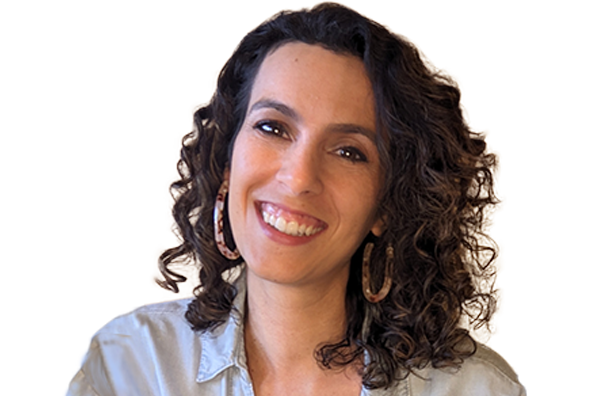
Lidia Aguilera
2
Lidia Aguilera (she/her) is a Ph.D. Candidate in the Hispanic Linguistics Program, and an international student from Spain who also completed her MA at UIC.
Her research interests focus on the impact students’ language experiences have on their daily lives, specifically how they affect their identity and the decision to whether or not to use their Spanish. Her research and teaching philosophy go hand in hand. She says, “I engage students in critically examining the ways they have been positioned, helping them to develop positive identities and nurturing their interest in continuing to develop their Spanish communicative repertoire.” In part, she argues, the maintenance and generational continuity of the Spanish language depends on young people; therefore, “this generation of Spanish bilingual college students is key in resisting and redefining how Spanish as a Heritage Language is treated in the U.S.”
Lidia currently serves as Chair of the Spanish for Heritage Learners Special Interest Group (SIG) at the American Council on the Teaching of Foreign Languages (ACTFL). Her active role at ACTFL allows her to connect with and learn from fellow language instructors from all over the country, and led her to co-author a chapter for the book When We Hear Them: Attuning Teachers to Language Diverse Students (in press) on critical approaches to teaching linguistically diverse Latine students.
LA Q1 Heading link
Lidia, what is one essential piece of advice you would give to fellow graduate students about teaching?
1
To me, there are two aspects that go hand in hand and are highly important. The first one is to understand that your life and education experiences are different from your students. I remember when my students were my same generation and similar age, and how easy it was for me to connect with them.
2
That is definitely not the case anymore, and it is by listening to them and tailoring my teaching in meaningful ways to them that I successfully connect with them. The second aspect is more of a clarification. Connecting with students is not about pretending I am one, or overdoing the “cool teacher” persona. I come to class being myself, but with a clear interest in connecting with them and supporting their journey in higher education.
LA Q2 Heading link
What do you appreciate most about teaching UIC’s students?
1
At the Spanish as a Heritage Language Program (HLP) students complete several argumentative essays in social and personal topics. I truly appreciate how they share experiences and opinions that enrich the class conversations, and how they connect with their peers and with me through the curricula.
2
I appreciate the opportunity each group provides me to reflect on my teaching and evolve in my teaching practices. I feel blessed that I can do research on linguistics that focuses on the social aspects of language, and I am extremely lucky that my students enthusiastically participate in my projects, which means they also get to support me in my journey in higher education. How cool is that?
2023-24 GSETMA Honorable Mentions Heading link
Marty Heath
1
Marty Heath (they/them) is a PhD candidate in the Department of Communication and a graduate of UIC’s Disability Ethics Certificate program. Their research focuses primarily on narratives of disability and technology including media representations and individuals’ life stories. For their dissertation, they are speaking to people who use prosthetic limbs to talk about their relationships to these assistive technologies, uplifting users’ experiences in discourses which are often dominated by designers’ voices.
2

Marty Heath
MH Q1 Heading link
Marty, what is one essential piece of advice you would give to fellow graduate students about teaching?
1
I come from a family of teachers, so my most essential piece of advice is to share your materials and experiences with other instructors! One of the most valuable traits that we can have as teachers is to be adaptable. That includes integrating anti-ableist pedagogy such as making our courses as accessible as possible to as many students as possible and altering them to meet the specific needs of our students each semester.
2
It also means that we can follow the lead of our students to keep the material fresh. By sharing with other instructors we can adopt and adapt each others’ activities, learn from each others’ best and worst days, and discover our own teaching styles in the process.
MH Q2 Heading link
What do you appreciate most about teaching UIC’s students?
1
I primarily work with first-year students, so I get to see students right at the beginning of their journeys at UIC. All of my students come here with rich experiences that inform their worldviews and I get to see them challenge one another and discover what they want out of their time here.
2
It is always exciting to see my students discover their strengths and passions and figure out how those traits can fuel their goals. I also want to shout out the amazing students who show up to my 8am classes ready to go even when they’re tired or it is snowing. They’re the real ones.
Jessie Miller Heading link
Jessie Miller
Jessie Miller
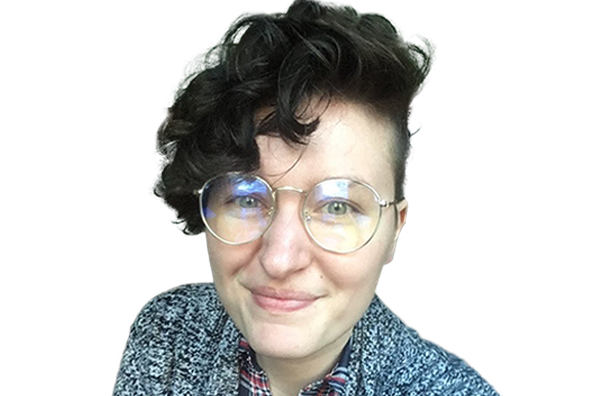
Jessie Miller
2
Jessie Miller (she/him) is a fourth year PhD student in the sociology department. A significant amount of his work focuses on bi+ health as well as race. Jessie’s dissertation will be on ethnoracial boundary construction between whites and various ethnoracial groups of Asian Americans in the Chicago suburbs. Teaching is ultimately what she is most passionate about however. Jessie received his FOCI Certificate from the Graduate College and also runs a Teaching Group in her department where grad students meet monthly to troubleshoot any teaching-related issues and to learn about new pedagogies. She is very passionate about learning new pedagogies and newer and better ways of engaging students and helping them learn difficult concepts.
JM Q1 Heading link
Jessie, what do you consider the most important aspect of teaching well?
1
To be quite honest, I think the most important aspect of teaching isn’t actually about teaching. It’s about caring for your students as individuals and making your classroom as safe and caring a learning environment as possible. Students are more engaged, are more willing to push themselves and their thinking when they feel they have a supportive learning environment in which to do that in. That’s why for me, I start off every semester by creating classroom agreements with my students, so students can feel empowered that this is their space.
2
In my classroom agreements, I also often make sure students come up with agreements on how to communicate with one another and how to handle conflict in the classroom when it arises. I am a big believer that we need to be equally in tune with our students’ social-emotional learning needs as we are to their intellectual ones.
JM Q2 Heading link
What do you appreciate most about teaching UIC’s students?
1
I could spend forever talking about the students at UIC, I love our students so much. I think our students are so bright, innovative, and willing to engage. Not to mention, students in the sociology department, in particular, tend to be hilarious, which is an added bonus.
2
But on a serious note, the students here at UIC constantly push me and inspire me to become more open-minded and a better educator; I truly wouldn’t be the educator I am today if it wasn’t for the amazing students we have here at UIC.
2023-24 GSETMA M.A. Recipients Heading link
Ashley Rasmussen
1
Ashley Rasmussen (she/her) is an M.S. student in Ecology and Evolution. Before coming to UIC, she graduated from Arizona State University with her B.S. in biological sciences in 2021 whilst a single mom. At UIC, she’s in the M.S. program in Dr. Miquel Gonzalez-Meler’s stable isotope lab. In her current work, she uses large datasets and R (coding language) to understand what Chicago urban tree biodiversity looks like, how it varies across the city, and if there are social/economic/environmental factors that are influencing the biodiversity seen. Her research is being supported by CROCUS (Community Research on Climate and Urban Science), a large project funded by the Department of Energy and Argonne National Laboratory.
2 photo named "headshot"
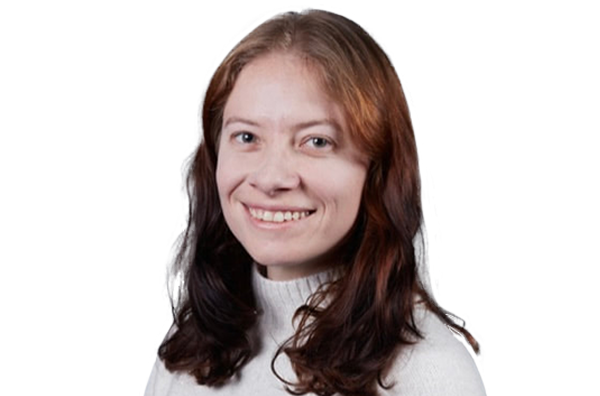
Ashley Rasmussen
AR Q1 Heading link
Ashley, what do you consider the most important aspect of teaching well?
1
The most important aspect of being an effective instructor is remembering what it was like to be an undergraduate. You have to ask yourself: what were some things that I struggled with? When I’m preparing for my labs/lectures, I use very clear language, present content sequentially, and I try my best to identify where people might get stuck. I would also say that it’s important to be genuinely you. I’ll make silly jokes with my students, include goofy images on my slides, etc.
2
I’ve embraced who I am and I think students can sense that because of this, I’m approachable because I’m human and a student just like them. Finally, don’t be afraid to change up how you’re teaching. Just like you’re not obligated to be the same person that you were yesterday, you also don’t have to teach like you did last semester. Change things up in the classroom and see how it goes.
AR Q2 Heading link
What do you appreciate most about teaching UIC’s students?
1
I really like seeing that lightbulb go off in a student’s head when they understand a concept. Even more though, I like it when my students see the importance in what they’re learning. When concepts are not just pure memorization or a way to achieve a certain grade, but they see the usefulness in what they’re being taught.
2
Specific to UIC, I love the diversity that we have on our campus and students here are generally very supportive of each other. That kind of dynamic makes me enjoy going to work every day, and I think it creates a productive class climate for everybody.
Denise Waite Heading link
Denise Waite
1
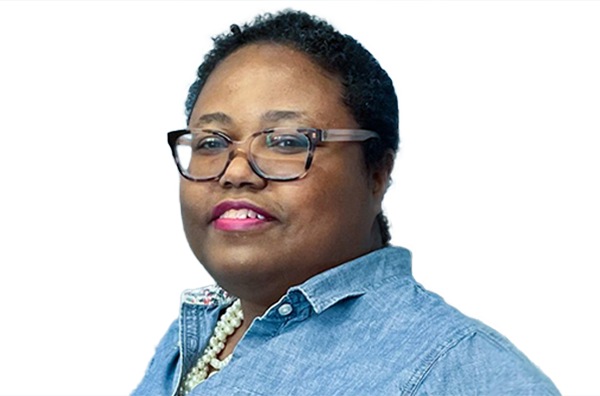
Denise Waite
2
Denise Waite (she/her) is a visual artist and writer and an English MA candidate in the Program for Writers. She is pursuing her English teaching licensure. Her artwork focuses on portraiture, chiefly luminous pastels and paintings. She says, “The slow accumulation of fleeting impressions is how I see my artwork and not unlike the process of getting to know someone. Each nuance of understanding becomes quite literally a layer of the piece”. Taking the time to really sit with and keenly observe a person is a practice that is at the heart of her work. Her writing in poetry, playwriting and prose seeks to vocalize the deeply intimate and ethereal moments in a person’s life. Denise brings her years of experience as an artist and writer to her work as a teacher, using her creativity and visual background to make her classes engaging. She states that “[my] background in art has given me a real blueprint for the teaching of writing…Ultimately English and Art Education are all about developing tools to express yourself.”
DW Q1 Heading link
Denise, what is one essential piece of advice you would give to fellow graduate students about teaching?
1
I think caring about your students is essential to teaching well. Everything else flows from there. It is the time, care and attention that you put into designing your syllabi and lessons that make a difference. It is also important to develop a strong rapport with your students. My best advice to fellow TAs is to cultivate empathy. Teaching is an interpersonal enterprise and the connection you foster with your students is crucial. Students need to feel comfortable and heard in the classroom. Having a genuine curiosity about your students and their lives is helpful. I always begin each class with “ice breakers,’’ questions relating to course themes that I pose to students to discuss in small groups and later share their answers with the class.
2
Last semester, I asked students questions such as “What is a place in nature that has special meaning to you and why?” to ones like “What is your favorite aspect of autumn?” These questions gave students the opportunity to think more deeply about ideas in the course while developing a supportive community of mutual understanding. I find cultivating a sense of community so important and healing for students who spent their high school years in the height of the pandemic.
DW Q2 Heading link
What do you appreciate most about teaching UIC students?
1
I absolutely love the diversity of student experiences. Teaching is truly a reciprocal experience and I learn so much from my students. They are constantly showing me a different way to look at things, places to check out in neighborhoods around Chicago and sharing moving stories about their communities.
2
Because many students chose to write about the neighborhood they grew up in, it helped me to get to know them better. It is encouraging to see students from so many different places come together to reach a common goal. Their determination and work ethic are truly inspiring.
Winners From Previous Years Heading link
-
Joshua Lovett
Joshua Lovett
1

Joshua Lovett
2
Joshua Lovett is a Ph.D. Student in the Community & Applied Developmental Psychology Program. His research broadly focuses on the social and emotional contexts of learning and particularly focuses on teachers’ social-emotional skills and well-being. Joshua’s current project is examining the ways in which teachers are adaptive in their lesson, and is excited for the multi-national study examining the connections between educator well-being and student outcomes that his lab is about to begin working on, which, he says, “is going to be a really interesting and rich experience.”
As the UIC recipient of GSETMA, Joshua was nominated to the Midwestern Association of Graduate Schools (MAGS) regional competition, and received an honorable mention as the runner-up in recognition of his excellence in graduate student teaching. He notes, “I really love that my research bridges research with teaching, which are sometimes viewed as totally separate skills. I think both are so critical for graduate students.”
JL question 1
Joshua, what is one essential piece of advice you would give to fellow graduate students about teaching?
1
An essential aspect of teaching, in my eyes, is really building a community together with students. I think students will grow so much more in an environment in which they feel safe, supported, and respected. As a teacher, I see part of my role in co-creating this positive environment with my students by learning who they are, bringing their lived experiences into the classroom, and trying my best to get to know them outside of their academic performance. I have found the classes that really have these elements often have richer, more nuanced discussions and insights.
2
One piece of advice I have to graduate students is to really find your unique style of teaching. Sometimes, I think we try to teach in ways that don’t really align with our personalities and gifts, so I often encourage my friends and colleagues to experiment with different styles of teaching. Also, I think finding good mentors is really important for learning new skills and seeing examples of innovative teaching techniques. I am so lucky to have had so many kind and exceptional mentors throughout my life, all of whom have influenced my teaching style and philosophy in so many ways.
JL question 2
What do you appreciate most about teaching UIC’s students?
1
There are so many things that UIC students bring with them into the classroom that add layers of nuance and complexity to our conversations. I see them as bringing so much knowledge already, and I try my best to tap into this existing knowledge to propel our class discussions and build upon things they might already know. They are very much much the experts of their own lived experiences, and I always try my best to honor that.
2
In addition, I find that UIC students are particularly interested in applying the class content to address real world problems, which is exciting to me given that I am interested in applied research. I am really fortunate to have the opportunity to learn with our students!
2022-23 GSETMA Honorable Mentions
2022-23 GSETMA Honorable Mentions
Andrea DaViera
1
Andrea DaViera is a doctoral candidate in the psychology department’s community psychology program. She cites teaching as one of her great joys, and is also highly involved in research and organizing/activism at UIC. She serves on the 2022/23 steering committee of the Graduate Employees Organization (GEO) as the outreach chair.
Andrea’s dissertation focuses on anti-racist student organizing at UIC. As a community psychologist in training, she sees social justice as a core responsibility in each of these endeavors.
2

Andrea DaViera
Adv question 1
Andrea, what is one essential piece of advice you would give to fellow graduate students about teaching?
1
Teaching is something you really have to do with your genuine self. I personally believe that classrooms are spaces where we can collectively generate knowledge — instead of me just telling students about facts and ideas that other people came up with.
2
I emphasize to my students that they already have very important experiential and sociohistorical knowledge; My goal is to help them shape that knowledge into action.
Adv question 2
What do you appreciate most about teaching UIC’s students?
1
As I also grew up for a time in Chicago, teaching at UIC specifically is very near and dear to my heart. I am especially inspired by UIC students because I can see a lot of similarities between us.
2
I want to inspire all students from any background that they can make a positive change in the world. Our students are really our future.
honorable mention 2
Sabrina Ali Jamal-Eddine
1

Sabrina Ali Jamal-Eddine
2
Sabrina Ali Jamal-Eddine, BSN RN is a PhD Candidate in UIC’s Department of Human Development Nursing Science and is simultaneously earning her Certificate in Disability Ethics through UIC’s Department of Disability and Human Development. Sabrina holds interdisciplinary focuses in Disability Studies and Critical Pedagogy. She is passionate about the development of innovative pedagogic strategies to educate students, instructors, and practitioners about identity-based oppression.
Sabrina’s dissertation explores the use of spoken word poetry as a form of critical narrative pedagogy to educate nursing students about disability, ableism, and disability justice. She hopes to create transformative change within nursing education praxis with the future goal to organize and lead an interdisciplinary community-engaged healthcare education center in a university that harnesses art and applied public humanities to promote radical liberation, humanization, and belongingness for patients, healthcare students, and practitioners.
SAJE question 1
Sabrina, what is one essential piece of advice you would give to fellow graduate students about teaching?
1
To me, the most important aspect of teaching is humanization. I promote this by showing up to my students authentically and vulnerably and recognizing and challenging unequal distributions of power. Revealing my humanness through storytelling and expressing my personality aids in creating a culture of trust and a safe learning environment where students feel comfortable voicing concerns or barriers to learning, taking risks, making mistakes, and growing without fear of penalization through grades which are the currency of power in education.
2
Humanizing education requires democracy that centers the interests and lived experiences of students and mandates that students actively participate in curricular design: I learned to functionally cultivate democracy in large class sizes by building flexibility into the assignments I design. For example, when possible, I allowed students to demonstrate their learning through self-selected mediums rather than pre-prescribed one-size-fits-all mediums such as traditional essay. Flexibility is simultaneously the key to accessibility in education.
SAJE question 2
What do you appreciate most about teaching UIC’s students?
1
I am so extremely grateful for UIC’s students: in addition to the diversity students bring which has allowed me to feel represented for the first time in academia, their activism, their commitment to social change, and their creativity have blown me away. I have so much pride for my students and their dedication to learning.
2
I am so grateful for faculty who have given me the opportunity to design and lead assignments that center creativity and accessibility through flexibility. The degree of trust and faith they held in me has been so instrumental to my development as an educator and I am forever grateful.
honorable mention 3
Anton Rozhkov
1
Anton Rozhkov is a Ph.D. candidate at the Department of Urban Planning and Policy. He does interdisciplinary research at the intersection of urban planning and energy policy. His research interests focus on how energy policies and new technologies can affect infrastructure planning and the design of our cities. Considering the existing complexity of today’s power grid, Anton is looking for a way to create sustainable and livable cities through the use complexity-based modeling tools.
At UIC, Anton teaches introductory and advanced-level classes on geographic information systems (GIS), which are digital mapping techniques that allow us to solve many problems of a geospatial nature.
2
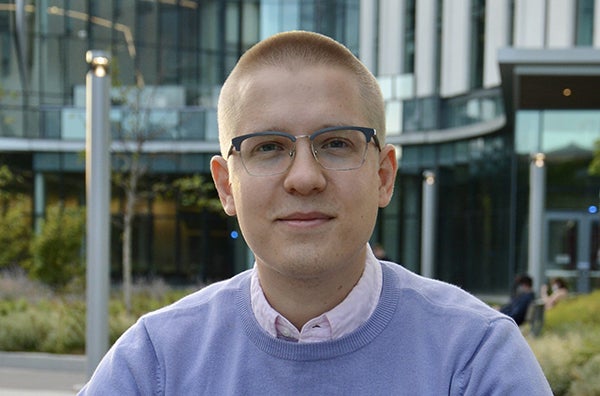
Anton Rozhkov
AR question 2
What do you appreciate most about teaching UIC’s students?
1
Being an international student myself, I really appreciate the diversity of students on the UIC campus. Students bring their stories from every part of the world, from small villages to huge metropolitan areas, which creates a fantastic mix of cultural enrichment and exposure to knowledge from different perspectives.
2
In addition, I see that students are continuously eager to learn, and both they and I truly benefit from our conversations inside and outside the classroom.
AR question 1
Anton, what is one essential piece of advice you would give to fellow graduate students about teaching?
1
The most important aspect of my classroom is to foster a positive and inclusive learning environment where all students feel valued and heard. I believe that in addition to getting technical knowledge about a subject itself, it is essential to teach students how to facilitate the acquisition of life-long learning skills. The classes I teach are often project-based classes with a lab component, so I provide students an opportunity to create and build their work based on real-life examples and get something more from the classes rather than simply information from readings, for example.
2
The advice I could give about teaching to fellow graduate students is to be flexible and responsive to student needs which are crucial in teaching well. Being able to promote a sense of community among students will allow you to create trust and a collaborative learning environment in the classroom.
-
Veronica Kang
Veronica Kang
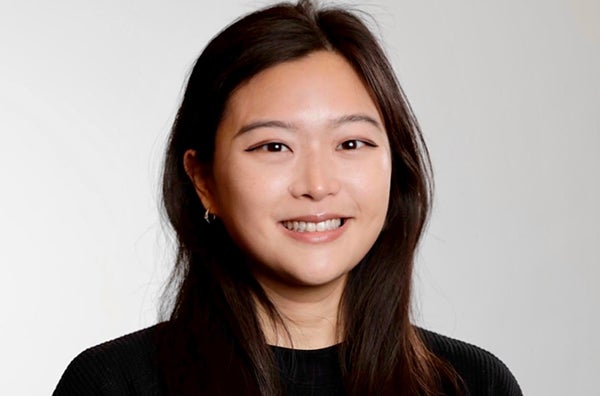
Dr. Veronica Kang
2
Dr. Veronica Kang will graduate from the Department of Special Education in May 2022. She is passionate about supporting and understanding the language/literacy and social communication development of learners of diverse backgrounds including ability, culture, and language in early intervention and early childhood education. Veronica advocates for accessibility, evidence-based practices, family collaboration, and community outreach in research and teaching.
Her recent work focused on (a) collaborating with siblings of young children with autism to use evidence-based strategies in their homes during play to introduce new vocabularies and (b) interviewing Asian American parents to understand their perspectives of and experiences in early intervention and special education in the U.S.
VK question 1
Dr. Kang, what is one essential piece of advice you would give to fellow graduate students about teaching?
1
First and foremost, I am so grateful that I was surrounded by many talented and kind faculty members at UIC who generously mentored me in my teaching journey. I also benefited tremendously from completing the Certificate program in the Foundations of College Instruction. The discussions and assignments in the three-course series were crucial in molding my teaching philosophy.
2
From both of these experiences, I learned the importance of building genuine relationships with the students, celebrating and respecting the diverse perspectives and experiences students bring, and encouraging meaningful reflection that could be applicable to students’ daily lives, their surrounding communities and people, and career goals.
question 2
What do you appreciate most about teaching UIC’s students?
1
I appreciate the beautiful diversity that the faculty, students, and staff bring, and this was the main reason why I joined UIC. Students at UIC have great passion and curiosity about not only developing new knowledge but also working together, being a positive influence in their communities, actively sharing their beliefs and values, and integrating very timely and important issues including race, culture, equity, diversity, and social justice.
2
Every day, I am challenged by the students’ questions and sharing in the group discussions and activities as well as personal emails and 1:1 conversations during the drop-in hours.
2021-22 GSETMA Honorable Mentions
Andrea Craft
1
Andrea Craft is a PhD candidate in the Department of Urban Planning & Policy. Their dissertation research is about governmental transparency and how it is being put into action as an instrument to build accountability to the public. They look at how transparency initiatives such as open data portals and community review processes are being used to promote equitable economic development and racial equity in the criminal justice system.
Andrea’s teaching specialization is geographic information systems (GIS) – how to use digital mapping technologies to analyze spatial problems and communicate ideas about the built environment.
2
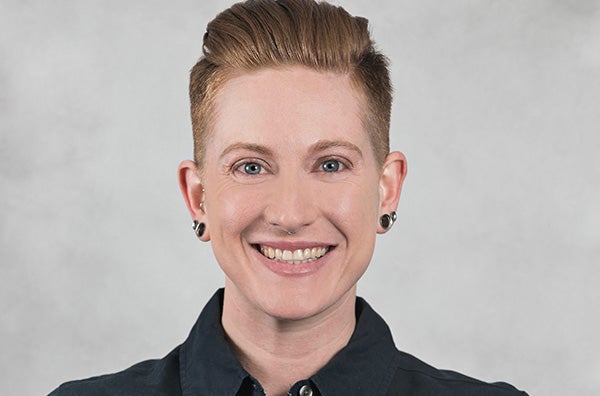
Andrea Craft
Andrea Craft question 1
Andrea, what is one essential piece of advice you would give to fellow graduate students about teaching?
1
I have two essential pieces of advice. First, join your union! Graduate students are an important part of carrying out the educational mission of UIC, and whether you are grading papers, assisting in the lab, or giving lectures, your labor counts. The Graduate Employees Organization (GEO, Local 6297) is how we have a say in our working conditions and is also an invaluable resource for getting support.
2
Second, you don’t have to know everything about your subject matter in order to be a great teacher, because teaching is about training students how to learn and how to think. Students might not remember some of the special topics you cover in your class, but they will forever carry with them the critical thinking skills they learned to understand how power operates in society or to evaluate different types of information.
question 2
What do you appreciate most about teaching UIC’s students?
1
UIC students are awesome because they are action-oriented. Especially in urban studies and planning, people are here because they want to make an intervention in their world and tackle the inequalities they have observed or experienced in their lives.
2
I also love how my students are open to participating in different ways, whether it is learning to use a new data collection app to make a map on their phone, or doing houseplants show-and-tell over Zoom, they are always down. Which is great because during the pandemic, there were some periods of time where remote teaching comprised the majority of my social interactions, and I was grateful to have a class of engaged and interesting people to look forward to seeing every week!
2021-22 GSETMA Honorable Mentions -2
Sangeetha Ravichandran
1
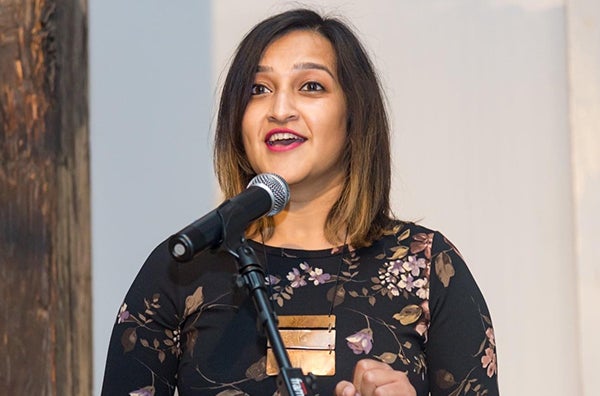
Sangeetha Ravichandran
2
Sangeetha Ravichandran is a Ph.D student in the Department of Sociology. She works on policing broadly, with a particular focus on genetics and policing/surveillance. Sangeetha is a member of the UIC Policing in Chicago Research Group, where she participates in community engaged research around race, gender, and intersectionality effects in police surveillance.
SR question 1
Sangeetha, what is one essential piece of advice you would give to fellow graduate students about teaching?
1
Remember that we are here because someone changed [the direction of] our needle. Every class we teach is an opportunity to be creative, to change UIC, and to change the way academia keeps people out.
2
I prioritize teaching students the structure and skills – such as self-advocacy, planning, and recognizing their needs in advance – that will allow them to succeed. I truly believe that at the end of getting their degree, students remember and carry what they learned because of their experience in the classroom and how they were treated, not the number of readings or content.
sv question 2
What do you appreciate most about teaching UIC’s students?
1
I appreciate learning from students through reciprocal conversational exchanges, because they bring experience from backgrounds that aren’t typically represented in academia.
2
In my classes we explore different kinds of knowledge and knowledge production beyond books and documents, such as artistic, folk, ancestral, generational, and community knowledges, including those that my students bring with them. All are welcomed.